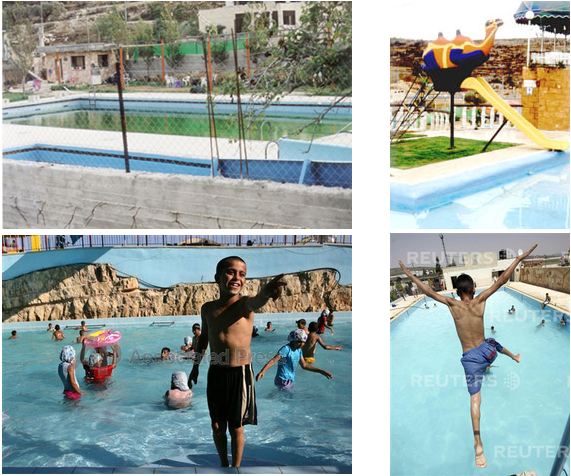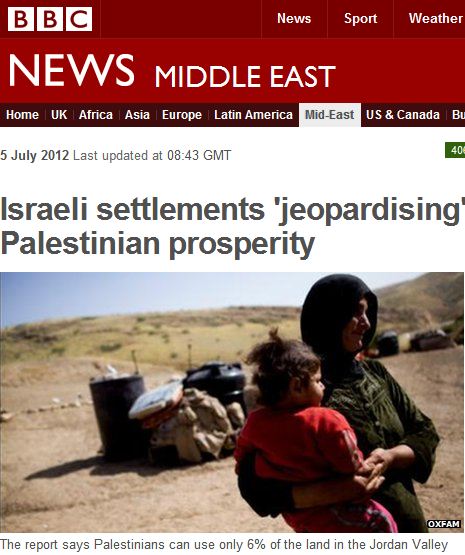Oxfam Distorts, BBC Reports: Jews Stealing land and water from Palestinians
On July 5, the BBC published the shocking results of a study recently conducted by the UK charity, Oxfam.
Regurgitating stale stereotypes, the thrust of Oxfam’s report is that Palestinian communities in the Jordan Valley area of the West Bank live in a ‘wretched reality’ as a result of settlement expansion and the related restrictions imposed on Palestinians on the use of land, water and movement – all of which, Oxfam claims, are destroying the viability of a future Palestinian state.
Oxfam is correct in its assessment of the Palestinian economy as a veritable basket case. Where this integral part of the “global movement for change” veers into tired dogma is in its singling out of Israel for approbation. Blame Israel first, investigate the facts never.
Regarding Israel’s restrictions on Palestinians’ access to water, this is an old myth that’s occasionally gussied up and tweaked for contemporary audiences. Truth is, Palestinians’ share of aquifers actually increased dramatically once control of the West Bank passed from Jordan to Israel in 1967, despite Israel’s limited water supply. Indeed much of the water related issues in the Palestinian territories are caused by the failure of the PA to implement Israeli approved projects. Over half of the wells approved for exploitation of the territory’s Eastern aquifer, for instance, have still not been drilled, though Israel approved permits for the project in 2000.(You can read a detailed fisking of the claim that Israel doesn’t supply Palestinians with enough water, here.)

Palestinian swimming pools in the West Bank. See more such images here: http://www.camera.org/index.asp?x_context=7&x_issue=12&x_article=1486
Another piece of propaganda passing for fact is the unexamined belief that Israeli settlements are being built on land that has been set aside for a future Palestinian state. While Palestinians can and often do challenge Israeli land seizures in court, the very definitions of private and state land in the disputed territories are a legal morass. Based on titles and deeds, land that is registered becomes private property. But what if there are no documents to prove ownership?
What’s now commonly referred to as the West Bank is territory that fell under the successive administrations of the Ottoman Empire, the British mandate, Jordan and now Israel. During the Ottoman Empire, only small areas of the West Bank were registered to specific owners. Often, villagers would hold land in common to avoid taxes. The British began a more formal land registry based on land use, taxation or house ownership that continued through the Jordanian period.
Legally speaking, and in stark contrast to the BBC’s assertion that “settlements are considered illegal under international law…”, it is worth noting Israel captured the West Bank and Gaza Strip in a war of survival. In fact, Israel’s seizing of land in 1967 was, arguably, the ONLY legal acquisition of this territory in the 20th century. As such, the ultimate fate of all disputed territory is a matter to be left for the oft-stalled final status negotiations between Israel and the Palestinian Authority.
While the 1993 Oslo Accords attempted to find a resolution to the issues of settlements and borders, a settlement freeze was never a precondition for peace negotiations between Israel and the Palestinian Authority.
With regards to the Jordan Valley, its strategic importance along the eastern border of the West Bank makes Israel’s withdrawal a virtual non-starter in future peace talks with the Palestinians.
Since the end of the 1967 war, every Israeli government has considered the Jordan Valley to be the “eastern border” of Israel with Jordan. Most of the strip lying in present-day Israel and the West Bank has been declared state land by the Israeli government. As part of the Oslo Agreements, the strip was classified as Area C, with the exception of the enclave around Jericho
Next, Oxfam goes for the trifecta by reporting that the Palestinians could generate an extra £1bn ($1.5bn) a year if restrictions on their movements, along with the aforementioned land encroachment and water theft, were removed.
Like any other country, Israel must balance humanitarian and economic concerns (of Palestinians, in Israel’s case) with the very real security concerns of its citizens. Barriers, checkpoints and other limitations on mobility are an unfortunate yet vital necessity. Once a comprehensive peace agreement is signed between the Israelis and Palestinians, such security measures will become unnecessary and summarily voided.
For now, however, the best that can be hoped for is the occasional easing of restrictions on movement – dependent, of course, on the diminution of security threats. And Israel has made concerted efforts to oblige. In 2010, for example,Israel issued more than 651,000 entry permits to West Bank residents wishing to travel to Israel, an increase of 42 percent over 2009. In 2009-10, Israel removed more than 200 roadblocks and reduced the number of manned checkpoints from 41 to 14.
Going forward, Oxfam may want to consider laying off the double standards and obsessive condemnations of reasonable responses to terror vis-à-vis Israel. Continuing to do so only serves to cheapen its stated purpose of building “a future free from the injustice of poverty.”
As for the BBC, its publication of the Oxfam report lends credence to the widely held belief that the broadcasting organization relies solely on the Palestinian perspective, and consistently parrots the narrative of “partisan, agenda-driven” Israeli organizations critical of Israel.
http://cifwatch.com/2012/07/10/oxfam-distorts-bbc-reports-jews-stealing-land-and-water-from-palestinians/

No comments:
Post a Comment